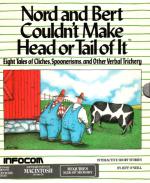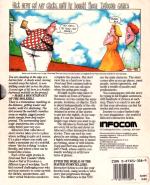|
Nord and Bert
Couldn't Make Head or Tail of It is different from any
other Infocom story you may have seen. Rather than being one
long story, it's a collection of eight short stories, or scenarios.
Each of the eight stories involves some sort of punning, wordplay,
or verbal trickery.
The people and
items you meet in one scenario won't appear in another, and
so each story is played independently of the others. However,
to get into the scenario called Meet the Mayor, you need to
know seven passwords. You get one password everytime you complete
one of the other seven scenarios. You can play these other
seven scenarios in any order.
Nord and Bert
also differs from other Infocom stories in that no mapping
is needed, and you won't use compass directions to move from
one place to another. Instead, the status line (at the top
of your screen) will tell you what places you can go next.
For example, the status line might say something like this:
You can go: Barn, Stable, Field
Just type the name
of the place you want to go and press the RETURN
(or ENTER)
key; in this case, you can just type BARN
or STABLE
or FIELD.
Another new feature
of Nord and Bert is the inclusion of hints. If you
ever get stuck, you can type HINT
and press the RETURN
(or ENTER)
key. Then follow the instructions on your screen. Hints are
organized by subject: so if you are stuck on a problem which
involves a hat, look for hints under the word "hat."
Nord and Bert
also has a new way of examining objects. You can examine an
object in any of the stories just by typing the name of the
object. For instance, to look at a trash compactor, you can
type LOOK AT THE COMPACTOR
or, more simply, COMPACTOR.
Of course, you also might want to LOOK INSIDE
or OPEN THE COMPACTOR.
To solve some of
the short stories, you will need to "transform"
some objects into other objects by using hormonyms or "spoonerisms."
(Hormonyms are different words that sound the same, like "bare"
and "bear"; spoonerisms are words with sounds transposed,
like "blowing grade" and "growing blade.")
For example:
There are some lunching mobsters here.
>MUNCHING LOBSTERS
With guns and butter, but without missing a mouthful, the
lunching mobsters around the table become munching lobsters.
or
A tuft of hair rocks gently in the breeze. The hair twitches.
>HARE
A cute brown hare hops toward you, nose and tail twitching.
Back
to top.
|

